-
ORIGINAL ARTICLE09-20-2024
Predictor variables effect on the development of Burnout Syndrome in higher education professor
Revista Brasileira de Enfermagem. 2024;77(4):e20240132
Abstract
ORIGINAL ARTICLEPredictor variables effect on the development of Burnout Syndrome in higher education professor
Revista Brasileira de Enfermagem. 2024;77(4):e20240132
DOI 10.1590/0034-7167-2024-0132
Views0See moreABSTRACT
Objectives:
to correlate the development of Burnout Syndrome in higher education professors with the following variables: sociodemographic, economic, work, sleep pattern, level of anxiety and quality of life.
Methods:
observational, analytical, cross-sectional study with a quantitative approach. Data collection took place from August to November 2022, with 140 professors from a private higher education institution in the Western Brazilian Amazon.
Results:
professors who carried out activities outside institutional hours and who had sleep duration < 5 hours, presented lower scores in the personal fulfillment dimension of burnout, with (p=0.002) and (p=0.001), respectively. The higher the scores for the physical (p=0.001), psychological (p=0.000) and social relationships (p=0.002) domains of quality of life, the lower the personal fulfillment scores for the syndrome.
Conclusions:
through linear regression, it was evidenced that several variables explain the development of burnout. Institutional and governmental actions can minimize the negative influence of these variables.
-
ORIGINAL ARTICLE09-20-2024
Construction and enhancement of a prototype for a medical-hospital equipment for hypodermoclysis: a qualitative study
Revista Brasileira de Enfermagem. 2024;77(4):e20240059
Abstract
ORIGINAL ARTICLEConstruction and enhancement of a prototype for a medical-hospital equipment for hypodermoclysis: a qualitative study
Revista Brasileira de Enfermagem. 2024;77(4):e20240059
DOI 10.1590/0034-7167-2024-0059
Views0See moreABSTRACT
Objectives:
to construct a Subcutaneous Hydration Device semi-functional prototype and gather initial information to improve this prototype design and realize its acceptance potential.
Methods:
a qualitative, descriptive and exploratory study, which used focus group, following the Technology Acceptance Model. The group was held at the Escola Superior de Enfermagem de Coimbra, Portugal, in December 2022, composed of nine participants from six different disciplinary areas, and followed thematic analysis.
Results:
four topics emerged associated with the device components: elastomeric infusion pump; needle/access device; clamp; administration set. From these topics, topics were triggered that highlighted: characteristics about the target population; ease of use and accessories; patient comfort and safety; and device application context.
Final Considerations:
the Subcutaneous Hydration Device semi-functional prototype is viable and interesting for the clinic. The results support its improvement and direct future investments for experimental studies.

-
REVIEW09-20-2024
Brazilian nursing specific situation, middle and micro-range theories: a bibliometric study
Revista Brasileira de Enfermagem. 2024;77(4):e20230520
Abstract
REVIEWBrazilian nursing specific situation, middle and micro-range theories: a bibliometric study
Revista Brasileira de Enfermagem. 2024;77(4):e20230520
DOI 10.1590/0034-7167-2023-0520
Views0See moreABSTRACT
Objectives:
to map the nursing theories developed in stricto sensu graduate programs in nursing in Brazil.
Methods:
a bibliometric study, carried out on the Coordination for the Improvement of Higher Education Personnel Theses and Dissertations Portal in October 2023. The controlled descriptors “Nursing Theory” and “Nursing Models” and the uncontrolled descriptors “Theories” and “Middle-Range Theory” were used. Selected studies were cataloged for analysis, which was conducted by the study authors, who have a doctoral degree and expertise in research on nursing theories.
Results:
thirty-nine nursing theories were mapped, with a predominance of middle-range theories (79.5%), focusing on nursing diagnostic concepts and use of the theoretical-methodology strategy of theoretical-causal validity.
Conclusions:
the study identified nursing theories developed in Brazil, recognizing trends, development strategies, theorized objects of disciplinary interest and investments necessary for practical application in Brazilian contexts.

-
ORIGINAL ARTICLE09-20-2024
Cross-cultural adaptation and validation of the Healthy Work Environment Assessment Tool in Brazilian culture
Revista Brasileira de Enfermagem. 2024;77(4):e20230505
Abstract
ORIGINAL ARTICLECross-cultural adaptation and validation of the Healthy Work Environment Assessment Tool in Brazilian culture
Revista Brasileira de Enfermagem. 2024;77(4):e20230505
DOI 10.1590/0034-7167-2023-0505
Views0ABSTRACT
Objectives:
to adapt and validate the content of the Healthy Work Environment Assessment Tool for Brazilian culture, and evaluate the practical aspects of its application.
Methods:
methodological study that followed six stages: translation; synthesis; back translation; content validation by a group of experts, pre-testing and approval of the process by the author of the original instrument.
Results:
the first three stages were carried out by contracted companies. In the committee, two items and the title of a subscale were evaluated in a second round, when consensus was reached among experts. In the pre-test, more than 93% of professionals agreed that the tool was easy to understand. The average completion time was 8.53 minutes. The American Association of Critical-Care Nurses authorized publication of the results.
Conclusions:
the adaptation of the tool to Brazilian culture was completed following the adopted framework. In addition to the evidence of content validity, the tool appears promising for managerial use.
Keywords:Cross-Cultural ComparisonHealth Facility EnvironmentTranslatingValidation StudyWorking ConditionsSee more -
ORIGINAL ARTICLE09-20-2024
Construction and validation of a checklist for the management of totally implanted catheters in children
Revista Brasileira de Enfermagem. 2024;77(4):e20230447
Abstract
ORIGINAL ARTICLEConstruction and validation of a checklist for the management of totally implanted catheters in children
Revista Brasileira de Enfermagem. 2024;77(4):e20230447
DOI 10.1590/0034-7167-2023-0447
Views0See moreABSTRACT
Objectives:
to construct and validate the content of a checklist for the management of totally implanted catheters in hospitalized children and adolescents.
Methods:
methodological research conducted from October 2021 to December 2022 in two stages: development of the instrument with care guidelines and content validation of the checklist. The instrument, containing 23 items presented in Likert format, was evaluated online by specialists in two rounds. The Content Validity Index was applied, considering indices above 0.8 as valid.
Results:
the final checklist included four domains and 22 checklist items, validated with a Content Validity Index of 0.98. The overall evaluation of the instrument presented a global score of 9.9.
Conclusions:
the validation and application of instruments that standardize procedures, in addition to supporting professionals, promote autonomy and quality of care for children and adolescents using this device.

-
ORIGINAL ARTICLE09-20-2024
Transgender people’s knowledge about the adverse effects of cross-hormonization: challenges for nursing
Revista Brasileira de Enfermagem. 2024;77(4):e20230346
Abstract
ORIGINAL ARTICLETransgender people’s knowledge about the adverse effects of cross-hormonization: challenges for nursing
Revista Brasileira de Enfermagem. 2024;77(4):e20230346
DOI 10.1590/0034-7167-2023-0346
Views0See moreABSTRACT
Objectives:
to identify trans women’s and men’s knowledge about the adverse effects of cross-hormonization and understand the repercussions of hormonization practices on trans women’s and men’s health.
Methods:
exploratory, descriptive, qualitative research, developed with 41 participants, from July 2019 to February 2020, in a trans health outpatient clinic. Thematic-categorical content analysis was used.
Results:
from the analysis, the categories emerged: Knowledge about the adverse effects of cross-hormonization; and Cross-hormonization practices and their meaning.
Final Considerations:
nursing practices, based on the identification of knowledge about adverse effects and the understanding of cross-hormonization practices in trans women’s and men’s health, can result in more inclusive care.
-
ORIGINAL ARTICLE09-20-2024
Sociocognitive factors determining compliance with standard precautions by nursing professionals during the COVID-19 pandemic
Revista Brasileira de Enfermagem. 2024;77(4):e20230301
Abstract
ORIGINAL ARTICLESociocognitive factors determining compliance with standard precautions by nursing professionals during the COVID-19 pandemic
Revista Brasileira de Enfermagem. 2024;77(4):e20230301
DOI 10.1590/0034-7167-2023-0301
Views0See moreABSTRACT
Objectives:
to assess the socio-cognitive factors determining adherence to standard precautions by nursing professionals in care practice during the COVID-19 pandemic in Brazil.
Methods:
an analytical cross-sectional study, carried out with 9,039 nursing professionals in Brazil, using an electronic form containing participant sociodemographic, training and work variables, and the Brazilian version of the Standard Precautions Questionnaire. Descriptive and inferential statistics were used using the statistical software R.
Results:
participants recognize standard precautions as effective measures to reduce infections and report intention to perform them. Training regarding standard precautions was evidenced as a facilitator of adherence (4.72; SD: 0.73), and problems related to materials (3.78; SD: 1.45) were a hindrance.
Conclusions:
among the determining factors, facilitating organization presented the highest score, followed by intention to perform. Facilitating and hindering factor identification makes it possible to develop intervention strategies to strengthen patient safety and reduce occupational risks among professionals.
-
ORIGINAL ARTICLE09-20-2024
Middle-range theory of the existential dimension of being-in-the-world of chronic kidney disease: Grounded Theory
Revista Brasileira de Enfermagem. 2024;77(4):e20230152
Abstract
ORIGINAL ARTICLEMiddle-range theory of the existential dimension of being-in-the-world of chronic kidney disease: Grounded Theory
Revista Brasileira de Enfermagem. 2024;77(4):e20230152
DOI 10.1590/0034-7167-2023-0152
Views0See moreABSTRACT
Objectives:
to develop a middle-range theory of the existential dimension of being-in-the-world of chronic kidney disease in the light of humanistic nursing theory.
Methods:
exploratory-descriptive, qualitative, Grounded Theory study, whose guiding question was: what theoretical relationships can be established between clinical practice carried out in the context of renal replacement therapies and the concepts of humanistic nursing theory? Data were collected through semi-structured interviews with nursing staff and chronic kidney disease patients.
Results:
a theory was developed that describes and explains the existential dimension of being-in-the-world of chronic kidney disease, identifying the qualitative evidence present in this context.
Final Considerations:
the theory contributes to clinical nursing practice qualification in nephrology, consolidating nursing as an art and science, because it arises from care practice and research, in addition to rescuing what differentiates it within the health disciplines, which is care par excellence.

-
ORIGINAL ARTICLE07-29-2024
Primary Health Care in transitional care of people with stroke
Revista Brasileira de Enfermagem. 2024;77(3):e20230468
Abstract
ORIGINAL ARTICLEPrimary Health Care in transitional care of people with stroke
Revista Brasileira de Enfermagem. 2024;77(3):e20230468
DOI 10.1590/0034-7167-2024-0468
Views0ABSTRACT
Objectives:
to understand the role of Primary Health Care teams in caring for people with stroke after hospital discharge.
Methods:
single case study, with integrated units of analysis, with a qualitative approach. Data triangulation occurred through interviews with professionals and family caregivers involved in transition of care, in addition to direct observations in rounds and document analysis. For the analyses, the analytical strategies of theoretical propositions and construction of explanations were used, with the help of ATLAS.ti®.
Results:
the importance of counter-referral, the role of community health workers and the multidisciplinary team, health promotion, secondary prevention, home visits as a visceral attribute and nurses as care managers are evident.
Final Considerations:
the high demand on teams and the Social Determinants of Health interfere with adequate continuity of care. Transitional care programs that enable continuity of care are recommended.
Keywords:Comprehensive Health CareContinuity of Patient CarePrimary Health CareStrokeTransitional CareSee more -
ORIGINAL ARTICLE07-29-2024
Completeness of variables in Hospital-Based Cancer Registries for prostatic malignant neoplasm
Revista Brasileira de Enfermagem. 2024;77(3):e20230467
Abstract
ORIGINAL ARTICLECompleteness of variables in Hospital-Based Cancer Registries for prostatic malignant neoplasm
Revista Brasileira de Enfermagem. 2024;77(3):e20230467
DOI 10.1590/0034-7167-2023-0467
Views0See moreABSTRACT
Objectives:
to analyze the completeness of variables from Hospital-Based Cancer Registries of cases of prostate neoplasm in the Oncology Care Network of a Brazilian state between 2000 and 2020.
Methods:
an ecological time series study, based on secondary data on prostate cancer Hospital-Based Cancer Registries prostate. Data incompleteness was classified as excellent (<5%), good (between 5%-10%), fair (10%-20%), poor (20%-50%) and very poor (>50%), according to the percentage of lack of information.
Results:
there were 13,519 cases of prostate cancer in the Hospital-Based Cancer Registries analyzed. The variables “family history of cancer” (p<0.001), “alcoholism” (p<0.001), “smoking” (p<0.001), “TNM staging” (p<0.001) had a decreasing trend, while “clinical start of treatment” (p<0.001), “origin” (p=0.008) and “occupation” (p<0.001) indicated an increasing trend.
Conclusions:
most Hospital-Based Cancer Registries variables showed excellent completeness, but important variables had high percentages of incompleteness, such as TNM and clinical staging, in addition to alcoholism and smoking.
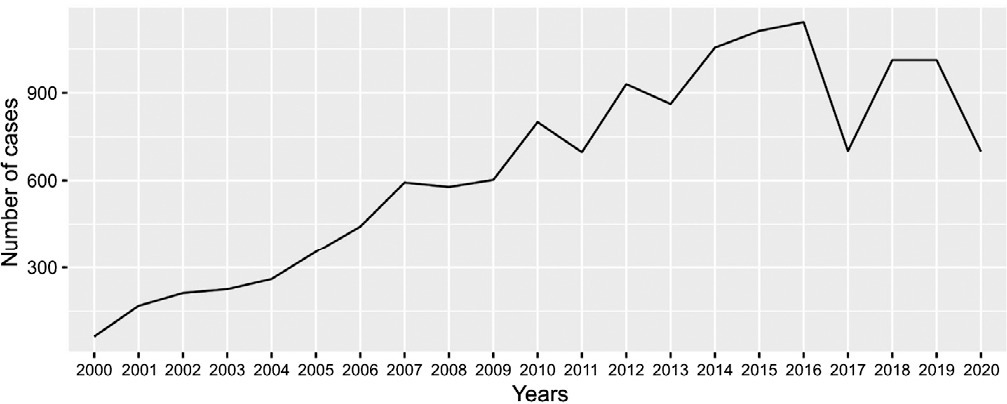
-
ORIGINAL ARTICLE07-29-2024
Disrupted mother-fetus dyad risk in high-risk pregnancies: a Middle-Range Theory
Revista Brasileira de Enfermagem. 2024;77(3):e20230464
Abstract
ORIGINAL ARTICLEDisrupted mother-fetus dyad risk in high-risk pregnancies: a Middle-Range Theory
Revista Brasileira de Enfermagem. 2024;77(3):e20230464
DOI 10.1590/0034-7167-2023-0464
Views0See moreABSTRACT
Objectives:
to develop and evaluate a Middle-Range Theory for the nursing diagnosis “Disrupted Mother-Fetus Dyad Risk” in high-risk pregnancies.
Methods:
this methodological study was conducted in two stages: theory development and evaluation. Dorothea Orem’s General Nursing Model was used as the theoretical-conceptual foundation. Evaluation was conducted using the Delphi method with seven judges, and consensus was achieved when the Content Validity Index of the evaluated items was ≥ 0.80.
Results:
the theory identified 20 elements of the nursing diagnosis “Disrupted Mother-Fetus Dyad Risk” (10 risk factors, 4 at-risk populations, and 6 associated conditions), 14 propositions, and 1 pictogram. After two rounds of evaluation, the theory was considered consistent, with consensus reached for all items, each achieving a Content Validity Index ≥ 0.80.
Conclusions:
the Middle-Range Theory included biopsychosocial factors explaining the nursing phenomenon “Disrupted Mother-Fetus Dyad Risk,” which aids in nurses’ diagnostic reasoning.
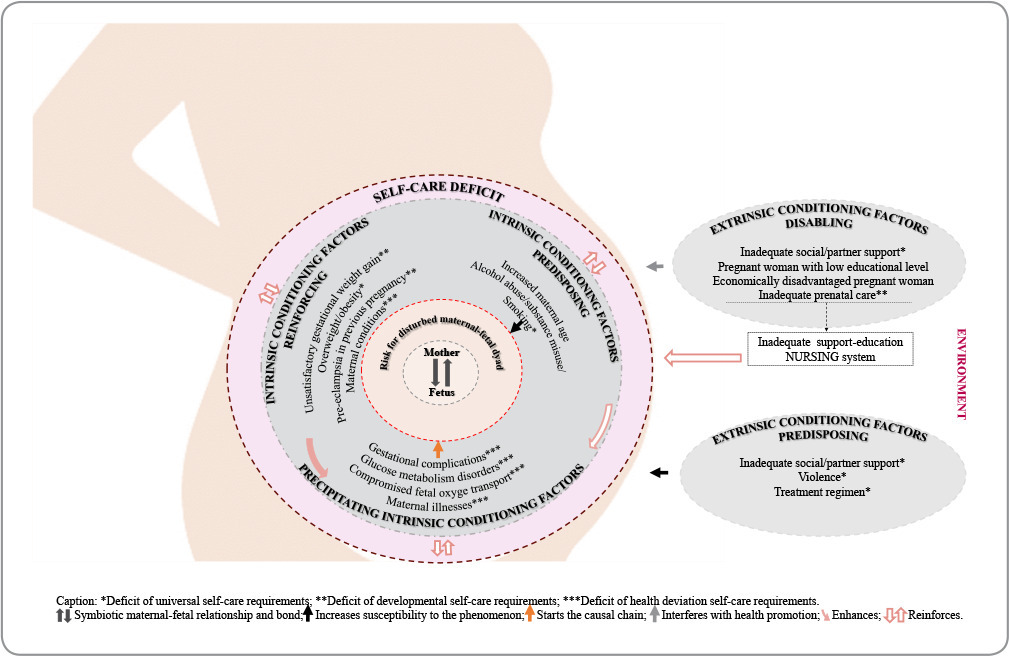
-
ORIGINAL ARTICLE07-29-2024
Mental health of parents of children and adolescents who require special health care
Revista Brasileira de Enfermagem. 2024;77(3):e20230457
Abstract
ORIGINAL ARTICLEMental health of parents of children and adolescents who require special health care
Revista Brasileira de Enfermagem. 2024;77(3):e20230457
DOI 10.1590/0034-7167-2023-0457
Views0See moreABSTRACT
Objective:
To identify the manifestations presented by parents of children and adolescents who require special health attention that can impact their mental health.
Methods:
exploratory, qualitative research, based on the concept of vulnerability, with data collection carried out through interviews with 18 parents of children and adolescents with special health care needs, hospitalized in the pediatric ward of a hospital in Paraná, between May/2017 and May/ 2018. Data analyzed by inductive thematic analysis.
Results:
parents experienced situations of vulnerability when providing care at home, with repercussions on their mental health, expressed by manifestations of lack of protection, anxiety and depression.
Final considerations:
It is important that health professionals seek to expand actions to promote care and reduce situations that generate threats, insecurities, concerns and damage to the health of parents, which can impact and further weaken care for children and adolescents who need attention especially health.
-
REVIEW07-29-2024
Profile of scientific production on nursing technology construction, validity and application: a bibliometric study
Revista Brasileira de Enfermagem. 2024;77(3):e20230452
Abstract
REVIEWProfile of scientific production on nursing technology construction, validity and application: a bibliometric study
Revista Brasileira de Enfermagem. 2024;77(3):e20230452
DOI 10.1590/0034-7167-2023-0452
Views0See moreABSTRACT
Objective:
to analyze the profile of scientific production on nursing technology construction, validity and application.
Methods:
this is a bibliometric study, carried out in six databases, based on the Methodi Ordinatio application, arranged in nine stages. To represent the findings, the VOSviewer® software was used.
Results:
346 studies were identified, obtained from BDENF, CINAHL, EMBASE, LILACS, PubMed/MEDLINE, Scopus and Web of Science. There was a predominance of the English language, and 20% of the authors hold more than 25% of studies. Only two journals account for 25% of studies in the period studied. Twenty-six studies were selected for the InOrdinatio classification. Nursing Process (23%) stood out among the studies. The most produced technology was software (27%), and 50% of works describe construction and validity.
Conclusions:
there is an emphasis on the creation of educational technologies, especially information technology. The data demonstrates opportunities for future research in the area.

-
ORIGINAL ARTICLE07-29-2024
Evaluation of software technical quality for collecting data from patients under palliative care
Revista Brasileira de Enfermagem. 2024;77(3):e20230435
Abstract
ORIGINAL ARTICLEEvaluation of software technical quality for collecting data from patients under palliative care
Revista Brasileira de Enfermagem. 2024;77(3):e20230435
DOI 10.1590/0034-7167-2023-0435
Views0See moreABSTRACT
Objectives:
to evaluate software technical quality for collecting data from patients under palliative care.
Methods:
this is methodological technology evaluation research, according to the technical standard International Organization for Standardization/International Electrotechnical Commission 25040-2011, developed from August 2021 to August 2023. Eight nurses and eight information technology professionals participated as judges, who evaluated six quality characteristics and 23 subcharacteristics. Items that reached a percentage of agreement greater than 70% were considered suitable.
Results:
the characteristics evaluated by nurses/information technology professionals received the following percentages of agreement, respectively: functional suitability (94%-84%); reliability (100-70%); usability (89.9-66.8%); performance efficiency (95.8%-86.1%); compatibility (95.8-79.6%); and safety (96%-83.4%).
Conclusions:
the software was considered suitable in quality evaluation to offer support to nurses in collecting patient data under palliative care, with the potential to operationalize the first Nursing Process stage.
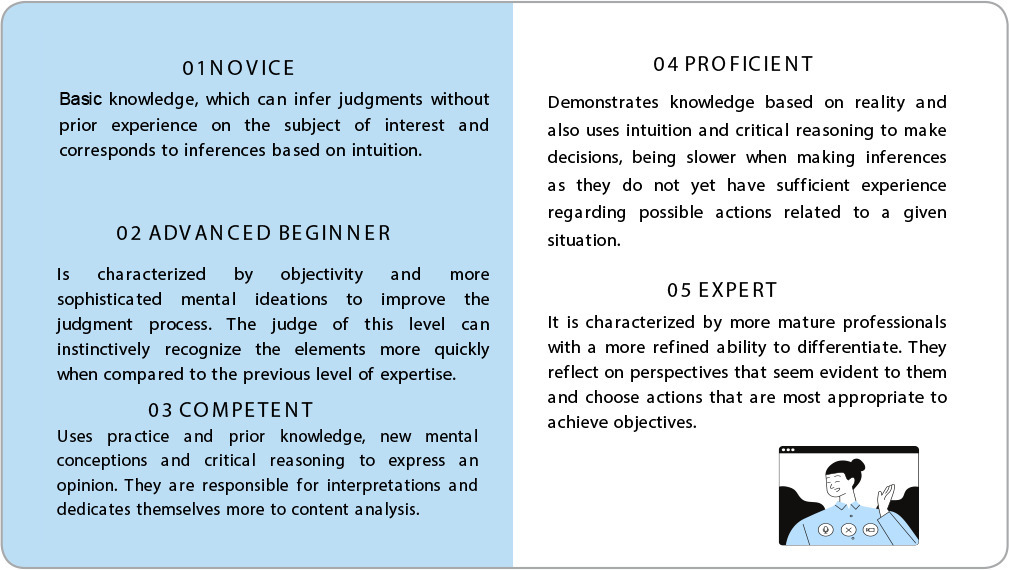
-
ORIGINAL ARTICLE07-29-2024
Sexual counseling for people with acute coronary syndrome: educational video development
Revista Brasileira de Enfermagem. 2024;77(3):e20230416
Abstract
ORIGINAL ARTICLESexual counseling for people with acute coronary syndrome: educational video development
Revista Brasileira de Enfermagem. 2024;77(3):e20230416
DOI 10.1590/0034-7167-2023-0416
Views0See moreABSTRACT
Objective:
to assess validity evidence of an educational video on safe sexual activity after acute coronary syndrome.
Method:
study in three phases: video development; content validity analysis by 11 experts; and analysis of validity based on response processes by seven people with coronary disease. The content validity ratio (CVR) was calculated with critical values for the second phase of 0.63 and for the third of 1.0.
Results:
the video addressed the importance of resuming sexual activity and positions that consume less energy, clinical warning signs, the importance of adhering to treatment and a welcoming environment for sexual practice. A CVR above the critical value was obtained with a total of 4 minutes and 41 seconds.
Conclusion:
the educational video brings together adequate content validity evidence and can be used as a tool for patients after acute coronary syndrome.
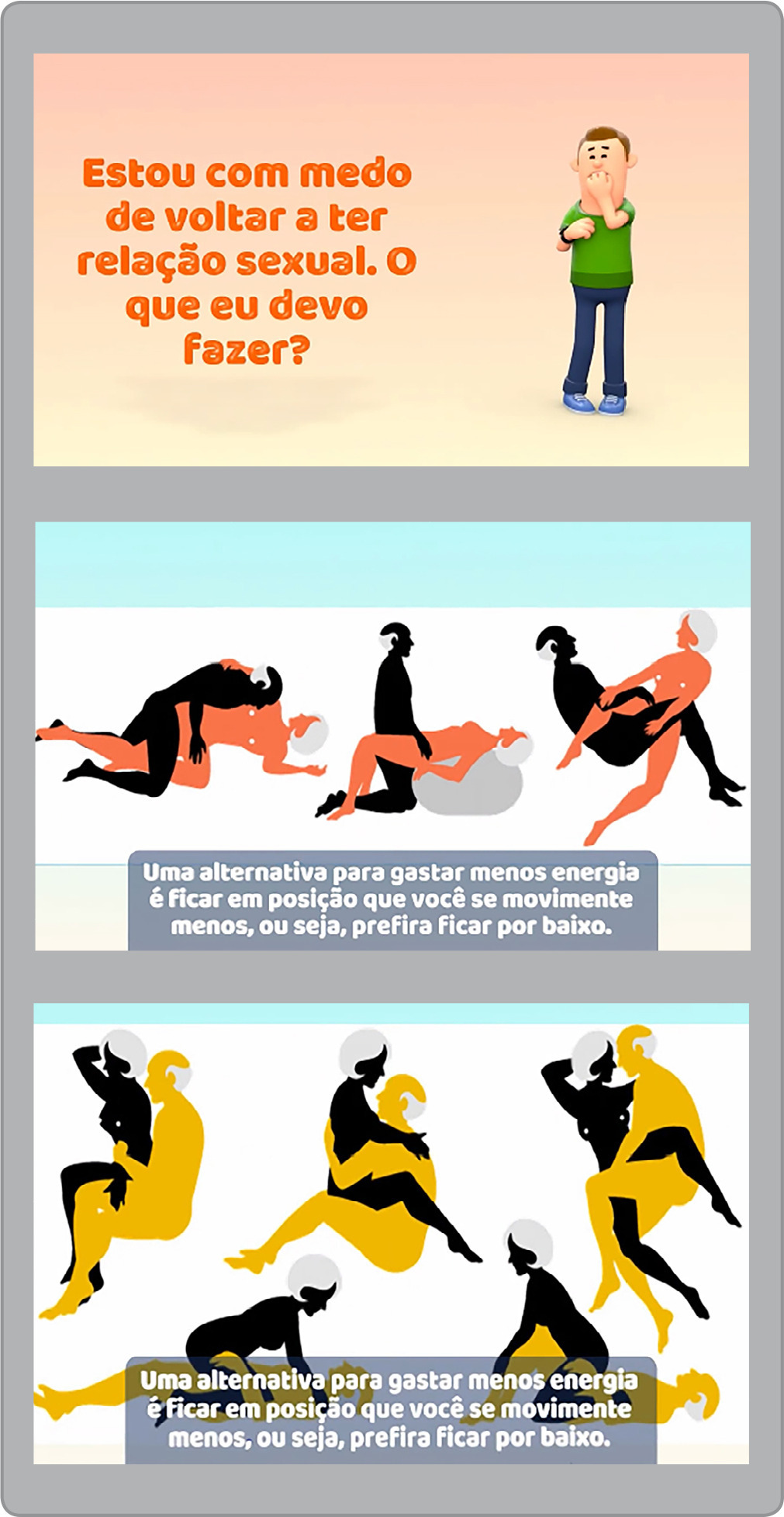
-
REVIEW07-29-2024
Utilization of local pressure devices in pain management during injections: scoping review
Revista Brasileira de Enfermagem. 2024;77(3):e20230399
Abstract
REVIEWUtilization of local pressure devices in pain management during injections: scoping review
Revista Brasileira de Enfermagem. 2024;77(3):e20230399
DOI 10.1590/0034-7167-2023-0399
Views0See moreABSTRACT
Objective:
to map scientific evidence regarding the use of local pressure devices in pain relief during injection procedures in patients.
Methods:
scoping review, following the recommendations of the JBI Manual for Evidence Synthesis and PRISMA-ScR, with searches conducted in the PubMed, EMBASE, CINAHL, LILACS, and PsycINFO databases, without temporal restrictions and with a cutoff date of March 2023.
Results:
a total of 1,514 studies were identified, with 20 articles included in the final sample. The ShotBlocker® device was utilized during subcutaneous and intramuscular injections in children and adults, proving beneficial in reducing pain, anxiety, and fear associated with the procedure.
Final considerations:
the ShotBlocker® is a low-cost, easy-to-use device that can enhance nursing clinical practice during painful procedures. However, studies involving the Brazilian Pikluc® device are scarce. Further research involving both local pressure devices is recommended.
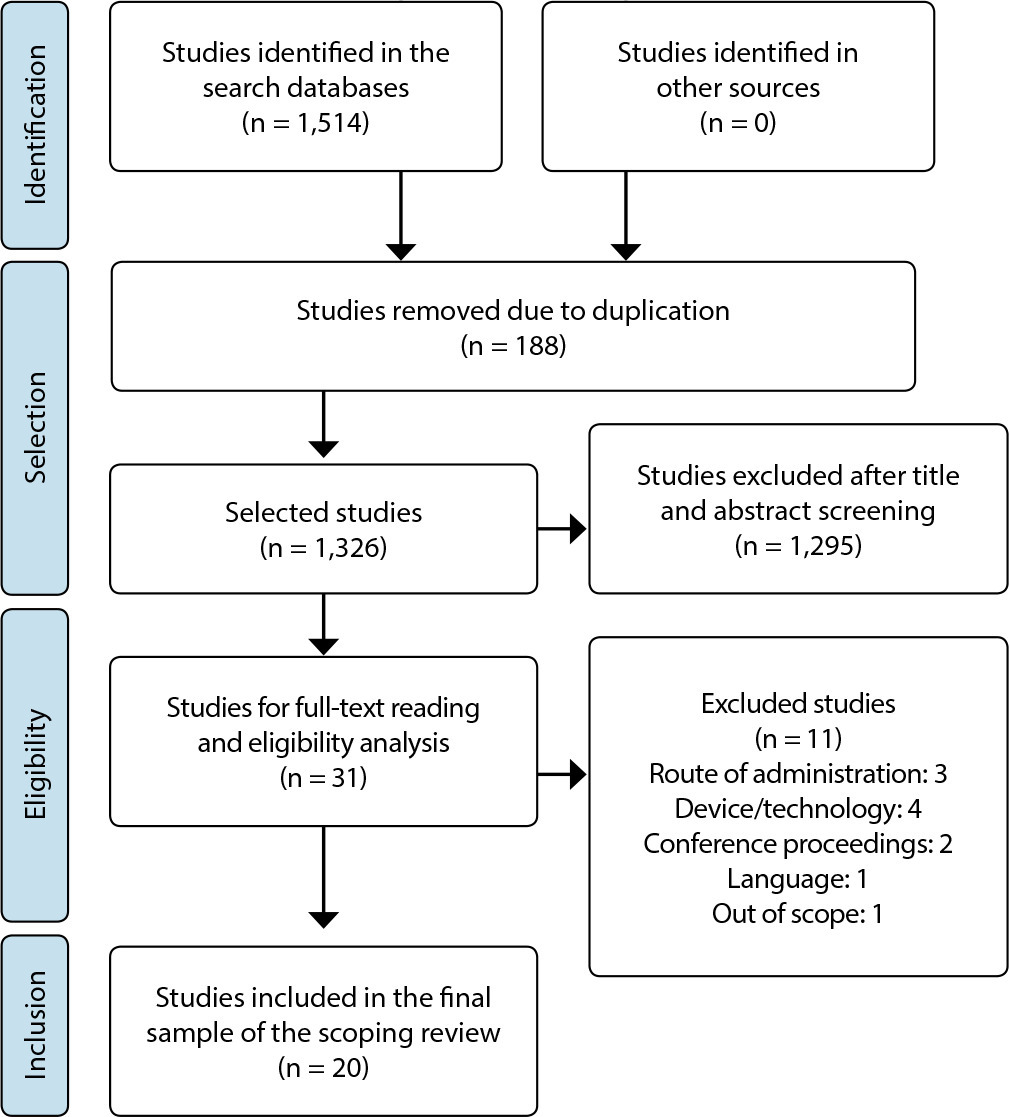
-
ORIGINAL ARTICLE10-06-2023
Nursing students’ professional values for reinforcing the professional identity
Revista Brasileira de Enfermagem. 2023;76:e20220338
Abstract
ORIGINAL ARTICLENursing students’ professional values for reinforcing the professional identity
Revista Brasileira de Enfermagem. 2023;76:e20220338
DOI 10.1590/0034-7167-2022-0338
Views0ABSTRACT
Objectives:
to understand the nursing students’ professional values in different Brazilian universities and verify a correlation between the “Professional Value” and the sociodemographic variables.
Methods:
quantitative, cross-sectional, and descriptive study conducted through an electronic questionnaire with a Professional Values Scale (NPVS-3). Participants were Nursing students of all semesters from three universities – two in the Southeast region and one in the North region.
Results:
of the 337 participating Nursing students, 282 were female. The Caring dimension presented the highest score (mean=46.61), and Professionalism, the lowest score (mean=34.65). A statistically significant association was detected between the Caring dimension, “university where is attending,” and “gender.”
Conclusions:
the results indicate the Caring dimension as the one containing the most scored professional values since the nurses’ training, and the relation of those values in such dimension is more significant in the female sample.
Keywords:Code of EthicsKnowledge ManagementNursing EthicsNursing StudentsRole of the Nursing ProfessionalSee more -
EDITORIAL10-06-2023
Pesquisa Translacional em Saúde: para onde vamos?
Revista Brasileira de Enfermagem. 2023;76(5):e760501
Abstract
EDITORIALPesquisa Translacional em Saúde: para onde vamos?
Revista Brasileira de Enfermagem. 2023;76(5):e760501
DOI 10.1590/0034-7167.2023760501pt
Views0Os contributos das pesquisas científicas são incontestáveis para o avanço da ciência e para a sociedade. Por isso, cada vez mais reflexões acerca dos impactos e da aplicabilidade dos estudos têm permeado o centro das discussões em nível global, sobretudo diante do aumento crescente da produção de conhecimentos. Nesse cenário, a translação da pesquisa (TP) […]See more -
EDITORIAL10-06-2023
Translational Health Research: where are we going?
Revista Brasileira de Enfermagem. 2023;76(5):e760501
Abstract
EDITORIALTranslational Health Research: where are we going?
Revista Brasileira de Enfermagem. 2023;76(5):e760501
DOI 10.1590/0034-7167.2023760501
Views0The contributions of scientific research are undeniable for the advancement of science and for society. Therefore, more and more reflections on the impacts and applicability of studies have permeated the center of discussions at a global level, especially considering the growing increase in knowledge production. In this scenario, research translation (RT) has a notable importance […]See more -
Advanced Practice Nursing: “Training” Pillar in Supporting the Proposal in Brazil
Revista Brasileira de Enfermagem. 2023;76(5):e20230118
Abstract
Advanced Practice Nursing: “Training” Pillar in Supporting the Proposal in Brazil
Revista Brasileira de Enfermagem. 2023;76(5):e20230118
DOI 10.1590/0034-7167-2023-0118
Views0ABSTRACT
Objectives:
to present the pillars that support what has been called Advanced Practice Nursing and discuss the necessary training for its implementation.
Methods:
elements contained in assessment documents for graduate programs proposals, reports of presentations by international professors in countries and selected scientific publications were gathered to compose the argument.
Results:
practice/competency (adds broad and in-depth knowledge about health processes and scientific evidence, clinical reasoning and clinical skills for therapeutic indications); 3) professional regulation (corresponding legislation and monitoring); and 4) funding (broad training and professional practice policy).
Final Considerations:
the agenda for implementing Advanced Practice Nursing in Brazil involves joining efforts to identify stakeholders for a work to legitimize their importance in the country’s health and education overview.
Keywords:Advanced Practice NursingEducationGraduateHealth Postgraduate ProgramsNursingNursing EducationPublic PolicySee more
-
ORIGINAL ARTICLE10-06-2023
Quality of health care in Primary Care: perspective of people with Diabetes Mellitus
Revista Brasileira de Enfermagem. 2023;76(5):e20230008
Abstract
ORIGINAL ARTICLEQuality of health care in Primary Care: perspective of people with Diabetes Mellitus
Revista Brasileira de Enfermagem. 2023;76(5):e20230008
DOI 10.1590/0034-7167-2023-0008
Views0See moreABSTRACT
Objectives:
to identify how people with diabetes assess the care offered by Primary Care teams.
Methods:
a cross-sectional study based on structured interviews with the application of the Patient Assessment of Chronic Illness instrument to people with Type 2 Diabetes Mellitus. Data were submitted to statistical analysis.
Results:
451 individuals participated in the study, more than half aged 60 years or older (64.0%); 63.9% had been diagnosed for more than five years; and 23.9% used insulin. The average score obtained was 2.5, which indicated little involvement in self-care and low support for the care of the chronic condition by the Family Health Strategy team, and was higher among women and people with a partner.
Conclusions:
people with diabetes consider that they do not receive individualized treatment, with dialogue and discussion for setting goals, and that they are not prepared for self-managing their health condition.

-
REVIEW10-06-2023
Nursing theories in the care of stroke patients: a scoping review
Revista Brasileira de Enfermagem. 2023;76(5):e20220791
Abstract
REVIEWNursing theories in the care of stroke patients: a scoping review
Revista Brasileira de Enfermagem. 2023;76(5):e20220791
DOI 10.1590/0034-7167-2022-0791
Views0See moreABSTRACT
Objectives:
to map and synthesize nursing theories and conceptual frameworks that have been applied in the practice of nursing care for stroke patients in hospital settings.
Methods:
a scoping review was conducted in October 2022 using the MEDLINE (accessed via PubMed), CINAHL, Scielo, and Web of Science databases, following The Joanna Briggs Institute guidelines.
Results:
nine studies incorporated six nursing theories and three conceptual frameworks, which were employed to enhance stroke patient care. The objective of these theories and conceptual frameworks was to facilitate the identification of the patient’s psychobiological, psychosocial, and psychospiritual needs, elucidate the nurse’s role and expand their perspective on rehabilitation, and acknowledge the survivor’s process of transition.
Final Considerations:
this mapping exercise identified major nursing theories, middle-range theories, and conceptual frameworks applied to the care of stroke patients.

-
ORIGINAL ARTICLE10-06-2023
Learning strategies of undergraduate nursing students during the COVID-19 pandemic
Revista Brasileira de Enfermagem. 2023;76(5):e20220764
Abstract
ORIGINAL ARTICLELearning strategies of undergraduate nursing students during the COVID-19 pandemic
Revista Brasileira de Enfermagem. 2023;76(5):e20220764
DOI 10.1590/0034-7167-2022-0764
Views0See moreABSTRACT
Objectives:
to analyze the learning strategies used by nursing students from a public university, in remote teaching, during the COVID-19 pandemic.
Methods:
a cross-sectional study developed with nursing students who attended remote teaching classes. The sample was obtained by convenience and data were collected online, with 112 participants. Student and Mann-Whitney tests were performed for data analysis.
Results:
the most frequently used learning strategies were self-regulatory and cognitive. There was moderate use of interpersonal help-seeking and emotional control strategies. Male students, with a private study environment and good internet connection, used emotional control strategies more frequently.
Conclusions:
self-regulatory and cognitive learning strategies, appropriate for higher education, were frequently used by nursing students, which is an important tool for adapting these students to the university context.
-
ORIGINAL ARTICLE10-06-2023
Nursing, history, and orthopedics in manuals (1875-1928)
Revista Brasileira de Enfermagem. 2023;76(5):e20220567
Abstract
ORIGINAL ARTICLENursing, history, and orthopedics in manuals (1875-1928)
Revista Brasileira de Enfermagem. 2023;76(5):e20220567
DOI 10.1590/0034-7167-2022-0567
Views0See moreABSTRACT
Objectives:
to discuss the content of manuals, with emphasis on orthopedics, in support of the development of nursing care culture.
Methods:
cultural-historical method articulated with document analysis technique. The sources were nursing manuals – Portuguese, French, English, and Spanish – from 1875 to 1928.
Results:
this study pointed to 12 works – 6 authored by physicians, 2 by nurses, 3 institutional, and 1 by a Sister of Charity – that presented, in a transversal way, the professionalization process initiated in Europe. The manuals addressed first aid care and immobilization methods, from the simplest, such as improvised splints, to the application of plaster casts.
Conclusions:
the nurses’ work, even in a limited capacity, showed that they were able to observe warning signs so that doctors could act, with some exceptions.

Search
Search in:
Nuvem de Tags
Aged (144) Atenção Primária à Saúde (239) COVID-19 (104) Cuidados de Enfermagem (269) Educação em Enfermagem (151) Educação em Saúde (139) Enfermagem (930) Estudos de Validação (131) Health Education (144) Idoso (208) Mental Health (149) Nursing (987) Nursing Care (306) Patient Safety (151) Primary Health Care (284) Qualidade de Vida (104) Quality of Life (106) Saúde Mental (145) Segurança do Paciente (150) Validation Studies (108)



